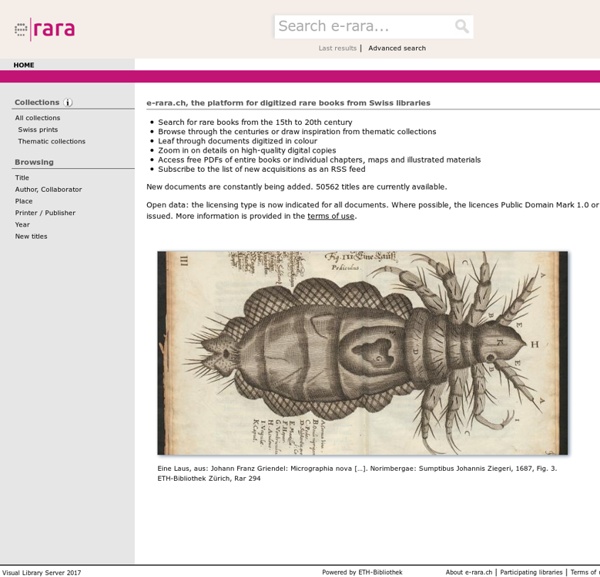



Five Medieval Chronicles that you can read translated online Page from the Nuremberg Chronicle We have come across many translated medieval sources through our online wanderings. Most medievalists will know about the larger databases of texts, such as the Internet Medieval Sourcebook and De Re Militari. However, there are a lot of sources that are not widely known, including these five chronicles from the Middle Ages. Cassiodorus’ Chronicle The Predicable Universal as Mental Word (A section from the diss. Presumes some things said earlier which are not posted. Some details added which didn’t fi in the original.) In the eighth question of de potentia, St. Thomas argues that:
Strabo, Geography, NOTICE. THE present translation of Strabo, the great Geographer of Antiquity, is the first which has been laid before the English public. It is curious that a classic of so much renown and intrinsic value should have remained a comparatively sealed book to this country for so many centuries; yet such is the fact. It is true that the imperfect state of the Greek text, and the difficulty of geographical identification, have always been appalling obstacles; yet, after the acute and valuable labours of Gossellin, Du Theil, Groskurd, and especially of Gustav Cramer of Berlin, (whose text is followed in the present volume,) we might fairly have expected that some English scholar would have ventured to enter the field. But the task, like many in a similar position, has been reserved for the publisher of the Classical Library, and he trusts it will be found conscientiously fulfilled.
LIBRARIES OF FAMOUS MEN If there is one thing the great men of history have in common it’s this: books. They read, a lot. Theodore Roosevelt carried a dozen books with him on his perilous exploration of the River of Doubt (including the Stoics). Lincoln read everything he could get his hands on (often recording passages he liked on spare boards because he didn’t have paper). Napoleon had a library of some 3,500 books with him at St. Ars Edendi - A Full Lectionary Project leader: Brian Møller Jensen Books used for the recitation of lessons in the Divine Office may appropriately be classified as liturgical texts. Although these naturally were very widespread in the Middle Ages, only a limited number of such manuscripts have been preserved, mostly in different local versions. In such a case, a viable scholarly alternative to producing a critical edition is to offer access to a modified diplomatic edition of a complete collection of lessons.
Q. Can I Print My Own Text and Rebind Along With a Bible? Posted by J. Mark Bertrand on Friday, September 17, 2010 · 25 Comments I received an interesting question from Father Robert Lyons that touches on two of my dreams: (1) using self-publishing technology to print your own text blocks and (2) rebinding supplemental texts under the same cover as a Bible. A lot of people wonder about the practicality of this, so here's the question followed by my attempt at an answer: Q. I am writing today because I am working on a project to produce a Liturgy book for our local congregation.
30 Medieval Texts Translated in 2016 From biographies of the leading warriors to the grumbling of a government official, here are thirty medieval texts that have been translated in 2016. Chronicles, law books, letter collections, religious and literary works were among those edited and translated this year, many for the first time. 1. Bibliotheca Palatina – digital: A Virtual Reconstruction of the Former Crown Jewel of Germany's Libraries One of the consequences of the Thirty Years' War was that the most important collection of books in the 17th century Holy Roman Empire, the Bibliotheca Palatina, was divided between two principal locations: Heidelberg and the Vatican. Since 2001, Heidelberg University Library has been working on several projects that aim to digitize parts of this great collection, the final goal being a complete virtual reconstruction of the 'mother of all libraries'. ‘A unique treasure is digitally reconstructed’ – the digitization of the Palatini latini in Rome is successcully completed. (Press release of Heidelberg University, 09.02.18) Here you will eventually be able to access more than 2,000 Latin manuscripts, as they are added one-by-one to the database.
Books and Titles Art | Economics | History | Law | Literature | Music | Philosophy | Political Theory | Religion | Science | Sociology | War and Peace Alphabetical List of all Titles | Liberty Fund Books online These are places to go to if you are looking for books, articles, pamphlets, audio, and other titles: Title search by key wordSee the 20 most recently added booksView an alphabetical list of all titlesTitles are organized into “collections” such as: Subject Areas or Disciplines [see below for a list]Topics of a more specialized nature, for example Free TradeSpecial Collections of high scholarly note, such as the Ludwig von Mises Library and the Toronto University Press edition of The Collected Works of John Stuart MillOther Collections, such as Primary Sources and the works of the Founding fathers of the American Republic and the U.S. More Information about the Collections